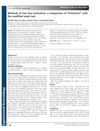 25 citations,
February 2022 in “JAAD International”
25 citations,
February 2022 in “JAAD International” Some COVID-19 patients lose hair, with the most common type linked to male hormones and possibly increasing the risk of severe illness.
 16 citations,
April 2014 in “Expert Opinion on Pharmacotherapy”
16 citations,
April 2014 in “Expert Opinion on Pharmacotherapy” Teriflunomide is an effective and safe first-line oral treatment for relapsing multiple sclerosis.
 February 2024 in “Frontiers in physics”
February 2024 in “Frontiers in physics” The new model detects hair clusters more accurately and efficiently, helping with early hair loss treatment and diagnosis.
 October 2023 in “Sinkron”
October 2023 in “Sinkron” The system can accurately classify hair diseases with 94.5% accuracy using a CNN.
 August 2022 in “Research Square (Research Square)”
August 2022 in “Research Square (Research Square)” Implanted special stem cells from hair follicles helped heal wounds faster and with less scarring in mice.
 April 2018 in “bioRxiv (Cold Spring Harbor Laboratory)”
April 2018 in “bioRxiv (Cold Spring Harbor Laboratory)” A gene variant causes patched hair loss in mice, similar to alopecia areata in humans.
216 citations,
May 2003 in “Journal of Investigative Dermatology” Glycerol is essential for skin hydration in mice without sebaceous glands.
56 citations,
October 2016 in “Journal of dermatological science” New insights into the causes and treatments for the autoimmune hair loss condition Alopecia areata have been made.
9 citations,
April 2018 in “Biology of reproduction” Diet changes hormone levels in pregnant ewes by affecting metabolism, not placental synthesis.
 8 citations,
March 2023 in “Journal of Clinical Epidemiology”
8 citations,
March 2023 in “Journal of Clinical Epidemiology” The updated GRADE guidance advises considering context when interpreting variability in research results and introduces tools for assessing subgroup effects.
 4 citations,
October 2022 in “Journal of Imaging”
4 citations,
October 2022 in “Journal of Imaging” An intelligent system can classify hair follicles and measure hair loss severity with reasonable accuracy.
21 citations,
November 2017 in “Cochrane library” Ovarian drilling surgery is not clearly better than medical treatments for PCOS symptoms.
78 citations,
November 2014 in “Functional Ecology” Heavily hunted wolves have higher stress and reproductive hormone levels.
 4 citations,
November 2021 in “Cancers”
4 citations,
November 2021 in “Cancers” The document concludes that understanding and managing hair loss in cancer patients is important, and more research is needed for better treatments.
 September 2023 in “Nature Communications”
September 2023 in “Nature Communications” Immune cells are essential for skin regeneration using biomaterial scaffolds.
61 citations,
April 2013 in “PloS one” The study found key genes and pathways involved in cashmere goat hair growth stages.
1 citations,
January 2023 in “Science Advances” The skin's microbiome helps hair regrow by boosting certain cell signals and metabolism.
December 2024 in “IntechOpen eBooks” Drug repurposing speeds up development, cuts costs, and uses known safe drugs, but faces challenges like regulations and patents.
 41 citations,
September 2018 in “Australasian journal of dermatology”
41 citations,
September 2018 in “Australasian journal of dermatology” No systemic treatment for alopecia areata has strong evidence of effectiveness.
March 2024 in “Agriculture” CRISPR/Cas9 gene-editing shows promise for improving sheep and goat breeding but faces challenges with efficiency and accuracy.
 18 citations,
March 2014 in “Current Pharmaceutical Biotechnology”
18 citations,
March 2014 in “Current Pharmaceutical Biotechnology” Metformin helps regulate menstrual cycles, induce ovulation, and improve pregnancy outcomes in women with PCOS.
 87 citations,
October 1997 in “JAMA”
87 citations,
October 1997 in “JAMA” Some vaccines might rarely cause hair loss, more research is needed.
 October 2020 in “Veterinary Dermatology”
October 2020 in “Veterinary Dermatology” New treatments and diagnostic methods for various animal skin conditions showed promising results.
 14 citations,
May 2013 in “Experimental Dermatology”
14 citations,
May 2013 in “Experimental Dermatology” The modified wash test is better than TrichoScan® for diagnosing hair loss.
 29 citations,
January 1993 in “Dermatologic Clinics”
29 citations,
January 1993 in “Dermatologic Clinics” Certain medications and maintaining adequate iron levels can help manage women's hair loss.
 8 citations,
March 1979 in “International Journal of Dermatology”
8 citations,
March 1979 in “International Journal of Dermatology” Dr. Vera H. Price's 1979 work emphasizes the importance of accurate diagnosis and personalized treatment for hair loss.
 7 citations,
September 1991 in “Journal of Advertising”
7 citations,
September 1991 in “Journal of Advertising” More profitable TV stations have stricter ad approval rules, and bigger stations are generally stricter too.
 9 citations,
January 2015 in “Current problems in dermatology”
9 citations,
January 2015 in “Current problems in dermatology” Scientists have found specific genes linked to different hair loss conditions, which could lead to new treatments.
 7 citations,
April 2012 in “Clinical investigation”
7 citations,
April 2012 in “Clinical investigation” Transdermal testosterone can improve sexual desire in postmenopausal women but lacks long-term safety data and is not FDA-approved for this use.
 2 citations,
March 2017 in “Veterinary dermatology”
2 citations,
March 2017 in “Veterinary dermatology” Herbal paste and oil extract might improve dog hair quality by retaining lipids.





















